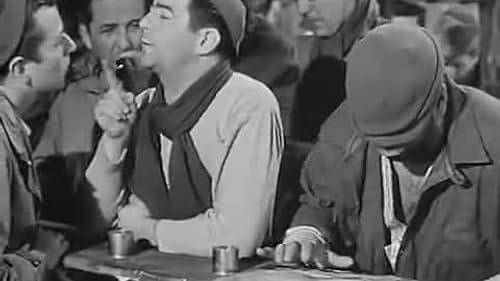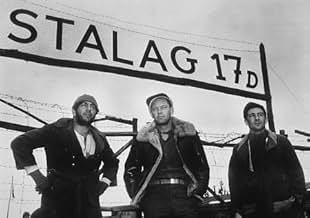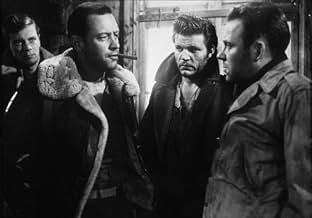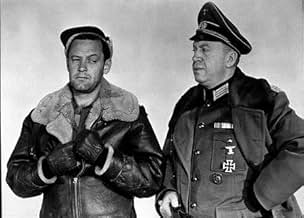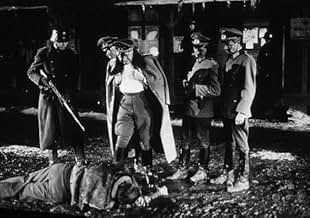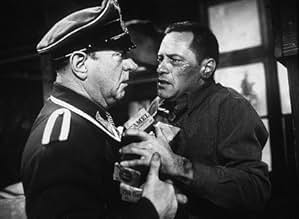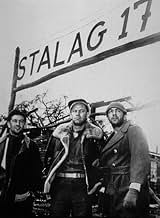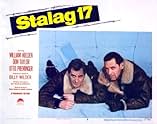After two Americans are killed while escaping from a German P.O.W. camp in World War II, the barracks black marketeer, J.J. Sefton, is suspected of being an informer.After two Americans are killed while escaping from a German P.O.W. camp in World War II, the barracks black marketeer, J.J. Sefton, is suspected of being an informer.After two Americans are killed while escaping from a German P.O.W. camp in World War II, the barracks black marketeer, J.J. Sefton, is suspected of being an informer.
- Won 1 Oscar
- 2 wins & 8 nominations total
Gil Stratton
- Sgt. Clarence Harvey 'Cookie' Cook
- (as Gil Stratton Jr.)
Featured reviews
This is one of Billy Wilder's best films and still stands up very well today. Unlike the concentration camps of the Holocaust, prison camps for Allied prisoners were actually not all that bad in comparison (except for how the Russian prisoners were treated--they were often just shot). So, the prisoners enjoyed a little more freedom and were constantly trying to deal with the incredible boredom of being locked up with very little to do. As a result, films about these camps (such as this one and THE GREAT ESCAPE) are few and far between--they would just be too dull to merit a movie. However, in the case of this film, the monotony is disrupted because there apparently is a snitch within the prisoners' ranks--some rat is tipping off the Commandant (director Otto Preminger--in one of his few acting roles) about escape attempts, major rule infractions and who the actual perpetrator of a major act of sabotage was.
Naturally, prisoners begin to think that William Holden is the snitch. After all, he is living incredibly well compared to all the other Allied prisoners in the camp due to all his money-making schemes and black market activities. In addition, he is so cynical and apparently unpatriotic that he has no desire to escape--he's more than willing to sit tight until the war is over since he is safe and happy! In this role, Holden's character is VERY similar to the one he played in BRIDGE OVER THE RIVER KWAI--where he is also a schemer and mostly focused on saving his own sorry butt! However, the problem of the snitch isn't so simply solved and much of the film is about how Holden proves he was NOT the spy for the Germans.
The movie is odd in that it is a combination of both drama and comedy--with alternating moods throughout the film. Some of the ways the bored prisoners create their own fun are incredibly funny (especially the "MEIN KAMPF" scene) and some of the moments are poignant and exciting (such as the escape at the end of the film). All this comes together wonderfully in the marvelous ending of the film. The movie features exceptional acting, writing and direction and is one of the best WWII films ever made. See it--it's well worth your time.
Naturally, prisoners begin to think that William Holden is the snitch. After all, he is living incredibly well compared to all the other Allied prisoners in the camp due to all his money-making schemes and black market activities. In addition, he is so cynical and apparently unpatriotic that he has no desire to escape--he's more than willing to sit tight until the war is over since he is safe and happy! In this role, Holden's character is VERY similar to the one he played in BRIDGE OVER THE RIVER KWAI--where he is also a schemer and mostly focused on saving his own sorry butt! However, the problem of the snitch isn't so simply solved and much of the film is about how Holden proves he was NOT the spy for the Germans.
The movie is odd in that it is a combination of both drama and comedy--with alternating moods throughout the film. Some of the ways the bored prisoners create their own fun are incredibly funny (especially the "MEIN KAMPF" scene) and some of the moments are poignant and exciting (such as the escape at the end of the film). All this comes together wonderfully in the marvelous ending of the film. The movie features exceptional acting, writing and direction and is one of the best WWII films ever made. See it--it's well worth your time.
This absorbing and very entertaining movie creates a believable and interesting cast of characters, puts them into an intriguing story, and uses its settings, props, and other resources very creatively. It is a fine combination of drama and comic relief that stands up very well against anything else of its type. The setting and atmosphere are quite believable, and they make it easy to enter the characters' world.
The opening sequence sets up everything nicely, with most of POW's helping two of the prisoners in an escape attempt, while William Holden as the cynical Sefton separates himself from the rest. Sefton is interesting enough as it is, a man who simply by remaining true to his nature cannot help arousing suspicion and antagonism, and Holden was quite a good choice to play him. The story builds up nicely, with developments coming at a careful pace, and some good stretches of lighter material.
There are numerous interesting characters and good performances among the other prisoners, and in particular Robert Strauss and Harvey Lembeck steal more than one scene with their antics which, though goofy, are also an appropriate complement to the main plot and the setting. The German characters are more stylized, but both Sig Ruman and Otto Preminger make them come to life, and help them fit in seamlessly with the others.
Billy Wilder's direction and the photography also deserve praise. Besides the way that each sequence fits together so nicely with the others, there are several individual scenes and shots that are done in an impressive fashion - not flashy, but creative and thoughtful. The scene with Holden lying on his cot while most of the others sing and celebrate is one particularly good example. There is a wealth of good material throughout, making "Stalag 17" a classic that has lost nothing over the years, and one that can be seen and enjoyed several times.
The opening sequence sets up everything nicely, with most of POW's helping two of the prisoners in an escape attempt, while William Holden as the cynical Sefton separates himself from the rest. Sefton is interesting enough as it is, a man who simply by remaining true to his nature cannot help arousing suspicion and antagonism, and Holden was quite a good choice to play him. The story builds up nicely, with developments coming at a careful pace, and some good stretches of lighter material.
There are numerous interesting characters and good performances among the other prisoners, and in particular Robert Strauss and Harvey Lembeck steal more than one scene with their antics which, though goofy, are also an appropriate complement to the main plot and the setting. The German characters are more stylized, but both Sig Ruman and Otto Preminger make them come to life, and help them fit in seamlessly with the others.
Billy Wilder's direction and the photography also deserve praise. Besides the way that each sequence fits together so nicely with the others, there are several individual scenes and shots that are done in an impressive fashion - not flashy, but creative and thoughtful. The scene with Holden lying on his cot while most of the others sing and celebrate is one particularly good example. There is a wealth of good material throughout, making "Stalag 17" a classic that has lost nothing over the years, and one that can be seen and enjoyed several times.
Director Billy Wilder was certainly no stranger to the horrors of World War Two. He was born in Austria-Hungary {now Poland} in 1906, but moved to Berlin to begin a career in movies. However, following the rise of Adolf Hitler, Wilder being Jewish fled for Paris and then the United States. His mother, grandmother and stepfather died at the Auschwitz concentration camp. As such, I think it'd be safe to presume that Wilder housed a considerable hatred towards Nazis, which makes his POW-picture, 'Stalag 17 (1953),' all the more remarkable. Whereas the film might have developed into a bleak, depressing drama, the screenplay by Wilder and Edwin Blum {adapted from a play by Donald Bevan and Edmund Trzcinski} effortlessly blends drama and comedy, clearing the path for other similarly-themed war-time films {David Lean's 'The Bridge on the River Kwai (1957)' and John Sturges' 'The Great Escape (1963)'} and even TV series {'Hogan's Heroes (1965-1971)' clearly used Wilder's film as a template including an identical Sgt. Schulz despite a failed court case in which producers sued for infringement}.
The year is 1944, in the week before Christmas. Stalag 17, a Nazi prisoner-of-war camp, is situated somewhere along the Danube River, and hundreds of captured Allied sergeants have been imprisoned there. The Americans of Barrack 4 endure a dull, deprived lifestyle, with each day consisting of unwholesome meals, tedious labour and uncomfortable living conditions. Displaying that typical American cleverness and resourcefulness, many of the prisoners have banded together to ensure themselves a few added luxuries such a makeshift radio to listen to the latest war news and to build an effective escape tunnel beneath the camp. However, it soon becomes apparent that there is a Nazi spy within their midst. After two escaping prisoners are immediately shot down, and their escape passage is inexplicably discovered, the men turn their suspicions towards J.J. Sefton (William Holden), a selfish and arrogant prisoner with a dog-eat-dog mentality that sees him openly bribing the German guards for luxuries. An unsympathetic character, one who nonetheless exhibits a certain streak of integrity, Sefton decides to uncover the true traitor of Barrack 4.
Though he was reluctant to play such an unlikable character, Holden won the Best Actor Oscar for his powerful performance {via the second-shortest acceptance speech in Academy Awards history a simple "thank you"}. The other actors in the film also create distinct and likable personalities, and I particularly enjoyed the big, oafish Animal (Robert Strauss) and Shapiro (Harvey Lembeck). Goodness knows what compelled the writers to make Sgt. Schulz (Sig Ruman), a loathsome tyrant in any other film, a jolly and hearty buffoon, but it works absolutely perfectly, his character's incompetence best highlighted in the sequence where he is distracted into playing volleyball, and enjoys the game so much that he hands his loaded weapon to the nearest POW. As Sefton attempts to uncover which fellow prisoner is leaving secret messages for their Nazis captors, Wilder intersperses the drama with an episodic flow of comedic situations, placing particularly emphasis on the means by which prisoners will alleviate their desire for the opposite sex. A hilarious sequence sees the drunken Animal mistaking his dressed-up bunk-mate for the cinema beauty Betty Grable, of whom he has an undying obsession.
The year is 1944, in the week before Christmas. Stalag 17, a Nazi prisoner-of-war camp, is situated somewhere along the Danube River, and hundreds of captured Allied sergeants have been imprisoned there. The Americans of Barrack 4 endure a dull, deprived lifestyle, with each day consisting of unwholesome meals, tedious labour and uncomfortable living conditions. Displaying that typical American cleverness and resourcefulness, many of the prisoners have banded together to ensure themselves a few added luxuries such a makeshift radio to listen to the latest war news and to build an effective escape tunnel beneath the camp. However, it soon becomes apparent that there is a Nazi spy within their midst. After two escaping prisoners are immediately shot down, and their escape passage is inexplicably discovered, the men turn their suspicions towards J.J. Sefton (William Holden), a selfish and arrogant prisoner with a dog-eat-dog mentality that sees him openly bribing the German guards for luxuries. An unsympathetic character, one who nonetheless exhibits a certain streak of integrity, Sefton decides to uncover the true traitor of Barrack 4.
Though he was reluctant to play such an unlikable character, Holden won the Best Actor Oscar for his powerful performance {via the second-shortest acceptance speech in Academy Awards history a simple "thank you"}. The other actors in the film also create distinct and likable personalities, and I particularly enjoyed the big, oafish Animal (Robert Strauss) and Shapiro (Harvey Lembeck). Goodness knows what compelled the writers to make Sgt. Schulz (Sig Ruman), a loathsome tyrant in any other film, a jolly and hearty buffoon, but it works absolutely perfectly, his character's incompetence best highlighted in the sequence where he is distracted into playing volleyball, and enjoys the game so much that he hands his loaded weapon to the nearest POW. As Sefton attempts to uncover which fellow prisoner is leaving secret messages for their Nazis captors, Wilder intersperses the drama with an episodic flow of comedic situations, placing particularly emphasis on the means by which prisoners will alleviate their desire for the opposite sex. A hilarious sequence sees the drunken Animal mistaking his dressed-up bunk-mate for the cinema beauty Betty Grable, of whom he has an undying obsession.
There was surprisingly enough a lot of humor in the American attitude toward the Nazis and the Germans during World War II. Life goes on even under the conditions of being prisoners of war, and people need to laugh. In such circumstances, they especially need to laugh. We can see that in some of the songs from that time and in this play from Donald Bevant and Edmund Trzcinski that Billy Wilder made into an unusually good movie. It should be realized that the full extent of the horror that the Nazis had visited upon Europe was not known until after the war was over and we saw the films of the concentration camps.
William Holden stars as Sgt J.J. Sefton whose amoral cynicism and gift for the cheap hustle allow him to feather his nest even while a prisoner of war.
He's the guy who always had a storehouse of cigarettes, booze, silk stockings, candy, etc. under his bunk, the guy who always won at cards, whose proposition bets always gave him the edge. We had a guy like that when I was in the army. We called him "Slick."
But William Holden's Sefton is more than Slick. He is outrageously cynical and uncommonly brave. He takes chances because he doesn't have the same kind of fear that others have. Most people would feel self-conscious (and nervous) eating a fried egg while everybody else in the barracks had watery-thin potato soup. Others might feel uncomfortable with bribing German guards for bottles of Riesling or tins of sardines. Not Sefton. He flaunts his store of goodies.
Perhaps that is overdone. Perhaps the real hardships that prisoners went through are glossed over in this comedic drama--a comedy, incidentally, that plays very much like a Broadway musical without the music. Perhaps it is the case that from the distance of 1953 the deprivations of Stalag 17 have faded from memory and it is the "good times" that are recalled.
At any rate, I think it is this kind of psychology that accounts for the success of this unusual blend of quasi-realism and burlesque. Certainly Stalag 17 has been widely imitated, most familiarly in the TV sit-com "Hogan's Heroes" and to some extent on Rowan and Martin's "Laugh-In." Roberto Benigni's Life Is Beautiful, on the other hand, which also finds humor in the horrific, is of a different genre. Like Ionesco's Rhinoceros, Benigni's movie is from the theater of the absurd, not the Broadway stage.
Holden won an Oscar for his performance and Robert Strauss who played Animal was nominated in a supporting role. Otto Preminger, the legendary director and producer, was excellent as the two-faced Col Von Scherbach, the ex-calvary commander and camp commandant who can only take a phone call from the high command with his boots on so he can click his heels. I also liked Sig Rumann as Sgt Johann Sebastian Schulz ("always making with the jokes, you Americans") whose previous career as a wrestler in the US accounts for his English-language skills. Gil Stratton, who for years did the sports for CBS Channel 2 in Los Angeles, is interesting as Sefton's sidekick and funky.
Indeed, what is responsible for the success of this movie as much as anything is this fine cast playing well-defined character roles. By the way, Strauss and Harvey Lembeck ("Sugar Lips" Shapiro) were reprising their roles from Broadway.
Important is the fine plot line in which Sefton is accused of being a spy for the Nazis while the real spy is exposed step by step. At first we don't know who it is, and then we do, and then the prisoners find out.
This should be compared with Sunset Boulevard (1950). While very different movies they have similar elements which reveal part of the psyche and methods of director Billy Wilder. First there is the anti-hero as the protagonist, in both cases played by William Holden. Then there is a lot of the old Hollywood crowd appearing in both films including directors appearing as actors, Erich von Stroheim (not to mention Cecil B. DeMille in his memorable cameo as himself) in Sunset Boulevard, and Otto Preminger here. Sig Rumann has over a 100 credits going back to at least the early thirties. Finally there is the discordant mix of comedic and dramatic elements, a mix that works on our psyches because life is to some very real extent filled with tragedy in close congruence with the laughable.
But see this for William Holden who was the kind of actor who was best playing a compromised character as here and as the failed writer/reluctant gigolo in Sunset Boulevard, an actor who drank too much and tended to undistinguished, but when carefully directed could rise above his intentions and give a sterling performance.
(Note: Over 500 of my movie reviews are now available in my book "Cut to the Chaise Lounge or I Can't Believe I Swallowed the Remote!" Get it at Amazon!)
William Holden stars as Sgt J.J. Sefton whose amoral cynicism and gift for the cheap hustle allow him to feather his nest even while a prisoner of war.
He's the guy who always had a storehouse of cigarettes, booze, silk stockings, candy, etc. under his bunk, the guy who always won at cards, whose proposition bets always gave him the edge. We had a guy like that when I was in the army. We called him "Slick."
But William Holden's Sefton is more than Slick. He is outrageously cynical and uncommonly brave. He takes chances because he doesn't have the same kind of fear that others have. Most people would feel self-conscious (and nervous) eating a fried egg while everybody else in the barracks had watery-thin potato soup. Others might feel uncomfortable with bribing German guards for bottles of Riesling or tins of sardines. Not Sefton. He flaunts his store of goodies.
Perhaps that is overdone. Perhaps the real hardships that prisoners went through are glossed over in this comedic drama--a comedy, incidentally, that plays very much like a Broadway musical without the music. Perhaps it is the case that from the distance of 1953 the deprivations of Stalag 17 have faded from memory and it is the "good times" that are recalled.
At any rate, I think it is this kind of psychology that accounts for the success of this unusual blend of quasi-realism and burlesque. Certainly Stalag 17 has been widely imitated, most familiarly in the TV sit-com "Hogan's Heroes" and to some extent on Rowan and Martin's "Laugh-In." Roberto Benigni's Life Is Beautiful, on the other hand, which also finds humor in the horrific, is of a different genre. Like Ionesco's Rhinoceros, Benigni's movie is from the theater of the absurd, not the Broadway stage.
Holden won an Oscar for his performance and Robert Strauss who played Animal was nominated in a supporting role. Otto Preminger, the legendary director and producer, was excellent as the two-faced Col Von Scherbach, the ex-calvary commander and camp commandant who can only take a phone call from the high command with his boots on so he can click his heels. I also liked Sig Rumann as Sgt Johann Sebastian Schulz ("always making with the jokes, you Americans") whose previous career as a wrestler in the US accounts for his English-language skills. Gil Stratton, who for years did the sports for CBS Channel 2 in Los Angeles, is interesting as Sefton's sidekick and funky.
Indeed, what is responsible for the success of this movie as much as anything is this fine cast playing well-defined character roles. By the way, Strauss and Harvey Lembeck ("Sugar Lips" Shapiro) were reprising their roles from Broadway.
Important is the fine plot line in which Sefton is accused of being a spy for the Nazis while the real spy is exposed step by step. At first we don't know who it is, and then we do, and then the prisoners find out.
This should be compared with Sunset Boulevard (1950). While very different movies they have similar elements which reveal part of the psyche and methods of director Billy Wilder. First there is the anti-hero as the protagonist, in both cases played by William Holden. Then there is a lot of the old Hollywood crowd appearing in both films including directors appearing as actors, Erich von Stroheim (not to mention Cecil B. DeMille in his memorable cameo as himself) in Sunset Boulevard, and Otto Preminger here. Sig Rumann has over a 100 credits going back to at least the early thirties. Finally there is the discordant mix of comedic and dramatic elements, a mix that works on our psyches because life is to some very real extent filled with tragedy in close congruence with the laughable.
But see this for William Holden who was the kind of actor who was best playing a compromised character as here and as the failed writer/reluctant gigolo in Sunset Boulevard, an actor who drank too much and tended to undistinguished, but when carefully directed could rise above his intentions and give a sterling performance.
(Note: Over 500 of my movie reviews are now available in my book "Cut to the Chaise Lounge or I Can't Believe I Swallowed the Remote!" Get it at Amazon!)
Stalag 17 (1953)
A far reaching precursor to the Stalag 13 of television's "Hogan's Heroes" and a bracing splash in the face for Americans grasping, still, the repercussions of WWII, "Stalag 17" was and is sharp, funny, and compact. On one simple level, it's enjoyable as a tightly made film, period. The acting, writing, editing, and photography--coordinated of course by now legendary director Billy Wilder--snaps like a whip, and two hours goes by fast. A host of minor actors pull of major performances, and the one really big name, William Holden, has the most unusual role, and he gives it an unfriendly edge that really helps save the movie.
Save the movie, that is, from a kind of frivolousness. It is, at its core, a really well made sitcom. The situation is a Nazi prison camp, not the kind of place we expect humor. And the comedy comes from making fun of the Nazis, who are always fair game. The reference to "Hogan's Heroes" is no joke, for those who have seen that 1960s series around the same situation (even including a comic Sgt. Schultz). The producers of "Stalag 17" sued the producers of "Hogan's Heroes" and won. But Stalag is not just a comic romp. There are shades of bitterness that reflect a real camp--almost the kind of gallows humor you need to survive a horrible situation. And there is also a serious strand about who you can trust, about finding the traitor on the inside, and about persecuting the wrong man.
Strictly a studio production, this falls just three years after Wilder's "Sunset Blvd"which uses Holden in another embittered role, and which makes fun of studio productions and Hollywood in general. Though based on a Broadway play, it rises above any sense of being set on a stage, and yet it really does not achieve any sense of realism. It's just short of a farce. The narration at the start announces that here, at last, we will have a movie not about the front and fighting, but about prisoners in a prison camp. It announces, that is, that it will be a different kind of WWII film.
And it is. Holden won best actor for his role. Otto Preminger, the great German director working in Hollywood (and bucking the censors there), plays the commandant of the prison. And Peter Graves is another prominent prisoner, a counterpart to Holden. The photography is by none other than the great Ernest Laszlo, and Franz Waxman heads up the music. It's no wonder it's a smart, sharp, snappy film. What it isn't, however, is deep or probing or moving. It's an entertainment, and a great one, but it keeps any larger expectations in check. And so should you.
A far reaching precursor to the Stalag 13 of television's "Hogan's Heroes" and a bracing splash in the face for Americans grasping, still, the repercussions of WWII, "Stalag 17" was and is sharp, funny, and compact. On one simple level, it's enjoyable as a tightly made film, period. The acting, writing, editing, and photography--coordinated of course by now legendary director Billy Wilder--snaps like a whip, and two hours goes by fast. A host of minor actors pull of major performances, and the one really big name, William Holden, has the most unusual role, and he gives it an unfriendly edge that really helps save the movie.
Save the movie, that is, from a kind of frivolousness. It is, at its core, a really well made sitcom. The situation is a Nazi prison camp, not the kind of place we expect humor. And the comedy comes from making fun of the Nazis, who are always fair game. The reference to "Hogan's Heroes" is no joke, for those who have seen that 1960s series around the same situation (even including a comic Sgt. Schultz). The producers of "Stalag 17" sued the producers of "Hogan's Heroes" and won. But Stalag is not just a comic romp. There are shades of bitterness that reflect a real camp--almost the kind of gallows humor you need to survive a horrible situation. And there is also a serious strand about who you can trust, about finding the traitor on the inside, and about persecuting the wrong man.
Strictly a studio production, this falls just three years after Wilder's "Sunset Blvd"which uses Holden in another embittered role, and which makes fun of studio productions and Hollywood in general. Though based on a Broadway play, it rises above any sense of being set on a stage, and yet it really does not achieve any sense of realism. It's just short of a farce. The narration at the start announces that here, at last, we will have a movie not about the front and fighting, but about prisoners in a prison camp. It announces, that is, that it will be a different kind of WWII film.
And it is. Holden won best actor for his role. Otto Preminger, the great German director working in Hollywood (and bucking the censors there), plays the commandant of the prison. And Peter Graves is another prominent prisoner, a counterpart to Holden. The photography is by none other than the great Ernest Laszlo, and Franz Waxman heads up the music. It's no wonder it's a smart, sharp, snappy film. What it isn't, however, is deep or probing or moving. It's an entertainment, and a great one, but it keeps any larger expectations in check. And so should you.
Storyline
Did you know
- TriviaWilliam Holden never felt he deserved an Oscar for his performance in this film. His wife felt it was to compensate for him not winning for "Sunset Boulevard (1950)."
- GoofsIt's December 1944. Every morning at 6:00 it's roll call for the prisoners of Stalag 17. Although in the middle of December, in southern Germany the sun will never rise before 8:00; the roll call in the movie is in full daylight.
- ConnectionsFeatured in Paramount Presents (1974)
- SoundtracksWhen Johnny Comes Marching Home
(1863) (uncredited)
Written by Louis Lambert
Played during the opening credits
Played on a record and sung by the prisoners of war
Whistled a bit by Gil Stratton at the end
Details
- Release date
- Country of origin
- Languages
- Also known as
- Infierno en la tierra
- Filming locations
- Production company
- See more company credits at IMDbPro
Box office
- Budget
- $1,661,530 (estimated)
- Runtime2 hours
- Color
- Aspect ratio
- 1.37 : 1
Contribute to this page
Suggest an edit or add missing content


